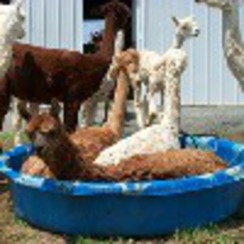|
December 12, 2011
Alpaca Cooling Options
By: Tim Sheets

A guideline to determine whether alpacas are at risk for heat stress is to add together the ambient humidity(%) and temperature(F). If the number is less than 120 there is minimal risk of heat stress. If the number is 150 or more it is wise to employ all precautions to prevent heat stress. When the number is 180 or above alpacas are at high risk for developing heat stress. At times like these employ ALL preventative measures, take caution, and observe your alpacas several times a day. Checking on them while changing their water buckets can be invaluable. If they are showing signs of increased respiration use a hose to water the underside of their bellies. Do NOT get their backs and sides too wet. A soaked fleece prevents air from circulating next to their skin and cooling them by evaporation. Here are some practical ways to cool your alpacas:
- Natural Ventilation
- often the least expensive but most effective cooling mechanism is just plenty of naturally moving air. Keep barn doors and windows open in the summer and, if possible, position open doors such the the prevailing winds can blow through the barn.
- Fans
- Fans are inexpensive to buy and to operate. They can move a fair amount of air when natural ventilation is not an option such as in enclosed builings. Fans are often used at shows to keep alpacas comfortable.
- Sprinklers
- Alpacas really enjoy water! Sprinklers are an effective way to keep the alpacas thermal window (their belly) cool. Control the sprinkler to come on a few times during hot days for 10-15 minutes. Regulate the flow so that the sprinkler only sprays their bellies.
- Kiddie Pools
- These provide an extremely quick and effective method of cooling an overheated alpaca. Fill it with just enough water to cool their bellies and change every day.
- Evaporative Coolers
- One of the more elaborate and expesive methods of cooling is with evaporative coolers. These devices can acually cool the inside of a barn by up to 15 degrees! Don't get these confused with misters. Relatively dry air is emitted so your alpacas stay dry, but cool.
|